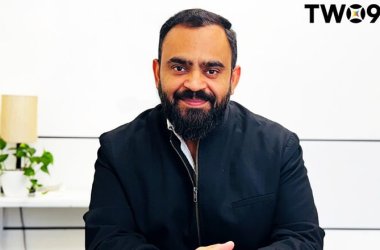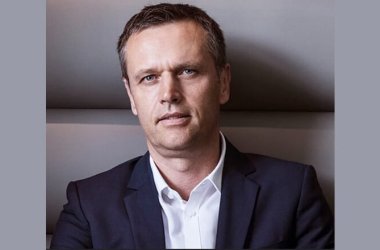Veronica Martin secured an exclusive interview with Kirk Skaugen, Executive Vice President at Lenovo, President Infrastructure Solutions Group, in a bid to find out about Lenovo’s strategic approach to its Infrastructure Business, the key drivers and objectives behind the company’s strong focus on AI and how AI will contribute to the growth and development of Lenovo’s Infrastructure Business Group.

CNME spoke to Skaugen at the Lenovo’s office in Dubai, where he outlined Lenovo’s strategic approach to its Infrastructure Business.
”Lenovo’s vision is to provide smarter technology for all. We’re working to become a global technology powerhouse and we’re excited now that 41% of our business is non-PC. Some of the fastest growing parts of our business are the software solutions and services, but also a data centre infrastructure. Since I’ve been here in 2016, we’ve gone from approximately number 10 in the world to number three in the server, the storage and data management, and now as an AI infrastructure provider. Our goal is to simplify the technology for people and be able to offer end-to-end solutions,” said Skaugen.
He also provided insights into the global and regional performance of Lenovo’s Infrastructure Business, especially in the MEA region.
”In the MEA region and specifically here in the Middle East, we grew triple digits last year, so it’s one of our fastest growing regions. Around the world we’re trying to grow at roughly double the market, but here in the Middle East we’re doing it much faster. We’ve become the largest supercomputer company in the world and approximately one in three of the top 500 computers in the world are running Lenovo.
We’re running 17 of the top 25 research universities now on Lenovo and we are also number 1 in the Green 500 list of the world’s most efficient supercomputers. Broadly speaking on infrastructure, we’re trying to drive edge to cloud. The amount of data in the world will double in the next two to three years. This will be more data than that’s been created in the entire history of the world up until now, but we’re only computing 2% of that data. At the same time, 75% of the compute will move out to the edge where the data’s created. This means the way we’re growing the infrastructure business at Lenovo is we’re taking the data out to the edge, whether that’s a smart factory or a smart hospital or smart retail or smart government, moving it out to the edge to do the computing. That this area will be a big focus for us as customers seek to use live data computed at the edge to boost efficiency of their businesses,” commented Skaugen.
Skaugen also shared some notable projects and clients the Lenovo Infrastructure Group is currently engaged with in the region.
”We’re working with nybl here in the UAE who are producing AI solutions for verticals such as oil & gas. We created an AI innovators’ program about three years ago where we invested over a billion dollars in AI and now we have over 165 AI solutions. As part of our AI innovators programme, Lenovo can take local home-grown companies such as nybl and allow them to offer their solutions globally to benefit our customers worldwide due to Lenovo’s presence in 180 markets.
ENOC is another example here in the UAE. We’re putting our edge servers into every gas station to deliver a better client experience from the gas pump to the security at the stations to the point-of-sale terminals. That’s been one of our largest edge server deployments on what we call our think agile platforms, which is a Nutanix software defined infrastructure.
We’ve also recently been chosen to build a supercomputer to enhance numerical forecasting models, increasing the timeliness of forecasts and enabling to issue warnings for severe weather incidents, so that preventative action can be taken,” said Skaugen.
In addition, Lenovo has made significant investments in AI and Skaugen explained what the key drivers and objectives are behind Lenovo’s strong focus on AI.
”We believe in AI for all and that eventually AI will be everywhere. We think of AI in three parts. Personal AI, that’s like a personal twin that will sit only on your PC or your phone and give you advice based on your personal habits. For example, if you ask for a good vacation, it will know your personal preference, where you’ve already gone, so it won’t recommend places where you’ve already been and whether you prefer a beach or a city holiday.
Then the second kind of AI will be enterprise AI or private AI. This is where either because of government sovereignty or the need to have your own IP in a data lake, you can ask AI to do things for your company without it going into the public cloud.
The third is public AI, such as ChatGPT where you want to have a pool of information from the public. We invested a billion dollars three years ago, created four AI innovation centres and 770 products that are AI centric.
We’ve become the third largest AI infrastructure company in the world, but the last part is how do you simplify this? Because there are over 16,000 AI startups in the world, and Lenovo is investing in some of those companies helping IT departments understand which are the most promising ones, and then certifying them on our hardware and then ultimately delivering professional services where we can deploy that into the market.
Now whether it’s cybersecurity, smart cities, smart retail, smart healthcare, smart manufacturing, we have 165 solutions in our AI innovator program. We grew 139% last year in a market that grew 39%, so we’re over a hundred points premium to the market as a result of being an early adopter of AI,” highlighted Skaugen.
Skaugen also outlined how AI will contribute to the growth and development of Lenovo’s Infrastructure Business Group.
”We are the reference designer for OVX, for the omniverse and Metaverse. We are partnering with NVIDIA and Microsoft to run Azure cloud for Nvidia OVX. This means if you’re going to do a digital twin or things in the metaverse, you will most likely be doing it on Lenovo technology. Additionally, we want to drive AI out to the edge, so I think we will have a tremendous growth as a result of the AI solutions we work on,” concluded Skaugen.
Lenovo Group is also undergoing a transition away from its traditional identity as a hardware-centric company. Skaugen elaborated on this transformation and shed light on its implications and strategies.
”At the Lenovo corporate level, we have our three SSS strategy, smarter devices (whether that’s tablets, PCs, phones, or headsets), smarter infrastructure and smart solutions and services. We have over 10,000 people that do maintenance and warranty support on our products worldwide, so we can deliver mission critical support.
We have a set of services around managed services with our Lenovo True Scale, so everything that we deliver at Lenovo, you can actually buy it as a service in a monthly subscription. We also have a whole new growing set of professional services. We’re bringing water cooling technology into the data centre and that’s 40% lower power consumption and super sustainable. We can actually do data centre design for people, AI consulting services and asset recovery services.
Part of our commitment to sustainability is we can actually recover the equipment of us or our competitor’s equipment and responsibly recycle it. We can actually give customers credit back if there’s value so that they get a discount on their future purchase. We can also give you a certificate that says that it was responsibly recycled. Especially here in the Middle East, a lot of the products are coming from our factory in Hungary, that is a net zero factory. We have also removed all the plastic from all our packaging on our PCs, so our commitment to sustainability is very strong as well,” said Skaugen.





